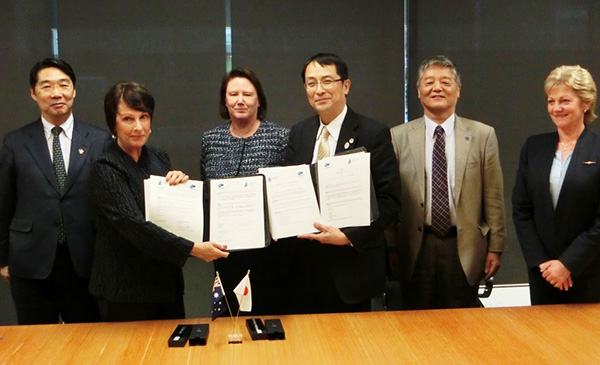In accordance with the 2007 Memorandum of Understanding on Cooperation in Education between Australia and Japan, the Department of Education and Training (DET) and the Ministry of Education, Culture, Sports, Science and Technology of Japan (MEXT) conducted the fourth High Level Policy Dialogue on Education in Canberra on 3 September 2015.
Japan values education highly and has for decades remained at or near the top of international measures of student learning and performance. Australia and Japan share a strong history of high-quality cooperation in education and research. For example, Japanese is the most popular foreign language studied in Australian schools and universities, and Australia is the most popular destination for Japanese school study tours and sister-school agreements.
As part of the broader “Abenomics” reform agenda, the Japanese Government is making significant changes to education policy, with a particular focus to date on internationalisation and university reform. The government has committed to doubling the number of inbound and outbound students by the time of the 2020 Olympics and Paralympics. New reforms are aimed at increasing the performance of the vocational education and training system, as well as English-language education.
The policy dialogue provides a platform for senior officials to discuss issues of interest to both countries, and a wide range of topics was covered at the meeting. Priority was placed on cooperation in languages education, skills development and higher education, increasing two-way mobility, quality assurance and qualifications frameworks.
The discussion clearly demonstrated Australia and Japan’s commitment to strengthen education cooperation. As a follow up, both countries will explore opportunities for collaboration on qualification frameworks, and quality assurance in vocational education, and continue cooperation on university partnerships, student mobility and qualifications recognition in higher education. Both countries will also work to share best practice in innovative and joint PhD programs, as recommended at the
Australia-Japan higher education symposium and roundtable held in Tokyo in December 2014.
The meeting concluded with the signing of a new partnership agreement between Universities Australia (UA) and the Japan Association of National Universities (JANU). Their agreement includes a new staff exchange program and mutual recognition of respective qualifications between member universities, which will facilitate further mobility. The higher education quality assurance agencies of both countries also agreed to continue cooperation, including through staff exchange.
 Mr Kihei Maekawa, Deputy Minister of MEXT, led the Japanese delegation, and Ms Jessie Borthwick, Deputy Secretary A/g,
Mr Kihei Maekawa, Deputy Minister of MEXT, led the Japanese delegation, and Ms Jessie Borthwick, Deputy Secretary A/g, welcomed them to Canberra, together with Ms Anne Baly, Group Manager, International Group, who co-chaired the meeting with Mr Maekawa.
In addition to MEXT and DET, the meeting was attended by representatives of:
• The National Institution for Academic Degree and University Evaluation (NIAD-UE)
• The Japan Association of National Universities (JANU)
• The Australian Government Department of Foreign Affairs and Trade
• The Tertiary Education Quality and Standards Agency (TEQSA), Australia
• Universities Australia (UA)
• English Australia (EA).
In this way, continued policy dialogue and information sharing can lead to new opportunities for strengthened institutional partnerships and collaboration.